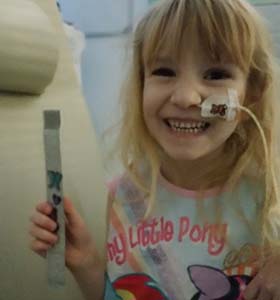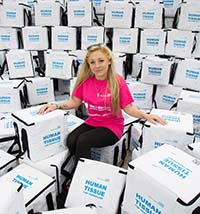Hundreds of transplants missed each year because families don’t know what relative wanted
More than three families a week are saying no to organ donation because they didn’t know what their relative wanted.
This means around 460 lifesaving organ transplants are being missed each year.
Left with the burden of making a decision for someone they love, the families decide it is safer to say no.
NHS Blood and Transplant has revealed the figure to mark Organ Donation Week (September 4 to 10) and is urging people to tell their families they want become lifesaving organ donors. The reluctance to talk about the issue is contributing to a deadly shortage of organs and leaving families to make a difficult decision when someone they love dies.
Last year 457 people died while on the active transplant waiting list and a further 875 people were removed from the list, mainly due to ill health. Many of these people will have died shortly after being removed. There are currently 6,414 people waiting for a transplant. (1)
Anthony Clarkson, Assistant Director of Organ Donation for NHS Blood and Transplant, said: “It’s a tragedy: hundreds of people are dying unnecessarily every year waiting for transplants.
“We know that if everyone who supported donation talked about it and agreed to donate, most of those lives would be saved.
“This Organ Donation Week, tell your family you want to save lives. A few words now can make an extraordinary difference. It will also make things much easier for your family to make the right decision.
“If you want to save lives, don’t leave it too late to talk to your family. If you want to be a donor, your family’s support is still needed for donation to go ahead, even if you are on the NHS Organ Donor Register.
“And if you are unsure about donation, please ask yourselves as a family; what would you do if one of you needed a transplant? Would you accept a lifesaving organ? If you’d take an organ, shouldn’t you be prepared to donate?”
Only one in every hundred people die in circumstances where they could donate, so every potential donor is precious. NHS Blood and Transplant’s annual audit of potential donors in 2016/17 shows 177 families said no to donation because “they were not sure whether the patient would have agreed”. Based on last year’s average number of 2.6 transplants per deceased donor, those refusals could instead have led to around 460 lifesaving or life transforming transplants. (2)
NHS Blood and Transplant surveys show more than 80% of people support organ donation but only around 49% of people have ever talked about it. (3)(4) Research shows that women are 30% more likely to start a conversation about organ donation than men. (4)
The top 5 reasons people gave for not having the conversation were:
1) It never came up – 33%
2) Don’t want to talk about death – 16%
3) Not got round to it yet – 17%
4) Donating organs is a personal choice, don’t need to talk about it – 14%
5) Others wouldn’t feel comfortable talking about it – 11% (4)
Families who agree to donation say it helps with their grief and that they feel enormous sense of pride at knowing their relative gave others the chance of a new beginning.
Aoife Marie O’Sullivan was only four when she died while waiting for a heart transplant in March 2016.
Aoife, who had restrictive cardiomyopathy, which made her heart muscle rigid, was able to donate her own kidneys for transplants.

Her parents, Michelle O’Sullivan and Neil Forsyth, from Leigh on Sea in Essex, support the need for people to talk about donation.
Michelle said: “Neil and I take comfort from that fact Aoife has given somebody more time with their loved ones. We feel very proud of Aoife.
“I would say to people ‘put yourself in the shoes of someone waiting for a transplant’.
“If you are willing to accept an organ donation, it is only right that you should be willing to donate the special gift of life to another family.”
Isabel Sewell, aged 20, from Poole, has polycystic kidney disease and has been on dialysis for three years and on the transplant waiting list for one year. She has dialysis three times a week.
Isabel said: “If someone was unsure about organ donation. I would ask them to imagine being in my situation. Dialysis only slows the decline and a transplant is my only long term option.”

Health Minister Jackie Doyle-Price said: “Donating an organ can quite simply transform someone’s life.
“I encourage everyone to use this opportunity to talk to their family about their wishes – a simple conversation could make such a big difference.”
To support Organ Donation Week please visit our promoting donation hub.
Charles Duke, 22, from New Milton, who has cystic fibrosis and is waiting for a lung transplant, with Isabel Sewell, 20, from Poole, who has polycystic kidney disease and is waiting for a kidney transplant, with 460 empty organ and tissue transport boxes at the NHS Blood and Transplant warehouse in Bristol. Around 460 potential transplants were missed last year when families declined to donate because they were not sure whether their relative would have agreed. NHS Blood and Transplant is urging people to tell their families they want to donate during Organ Donation Week, September 4 to 10. Photo NHSBT/Richard Crease.
Aoife O’Sullivan from Essex who died in March 2016 aged 4 while waiting for a heart transplant after suffering heart failure from restrictive cardiomyopathy.
Freddie McDonald, 4, and his older brother Louie from Ossett in West Yorkshire. Freddie had a liver transplant due to alagille syndrome in 2015. Freddie and Louie star in NHS Blood and Transplant’s ‘Hugs’ campaign video for Organ Donation Week 2017.
For additional information please contact Stephen Bailey on 0151 268 7017 or stephen.bailey@nhsbt.nhs.uk
Alternatively call the NHSBT Press Office on 01923 367 600 or email pressoffice@nhsbt.nhs.uk
For out of hours enquiries please call: 0117 969 2444
Press Release Notes
- As of Friday, August 25th 2017
- Figures from the 2016/2017 NHS Blood and Transplant UK Transplant Activity Report.
- NHSBT carries out biannual attitudinal surveys. The fourth wave in 2017, involved 1499 interviews carried out via online self-completion between the 10th and 21st of April 2017. In this wave, 81% of people supported organ donation in principle.
- NHSBT commissioned research specifically on organ donation conversations. The quantitative element comprised a survey of 2656 adults aged 18 years or above in England carried out online by YouGov from 15th to 19th May. 49% of people had had a conversation with a partner or family member about organ donation. Asked who would initiate a conversation about organ donation, 57% of women said they would expect themselves to do it, and 44% of men said they would expect themselves to do it.
NHSBT Notes to editors
NHS Blood and Transplant is a joint England and Wales Special Health Authority. We are responsible for ensuring a safe and efficient supply of blood and associated services to the NHS in England. We are also the organ donation organisation for the UK and are responsible for matching and allocating donated organs.
We are an essential part of the NHS and take pride in saving and improving lives by making the most of every voluntary donation, from blood and organs to tissues and stem cells.
Our work would not be possible without our donors - ordinary people doing extraordinary things by saving and improving the lives of others.
To find out more visit: www.nhsbt.nhs.uk
Follow us on social media
- Twitter: @NHSBT
- Facebook: www.facebook.com/nhsbloodandtransplant
- Instagram: @nhsorgandonor
- YouTube: www.youtube.com/user/NHSOrganDonation
- It is quick and easy to join the NHS Organ Donor Register. Visit www.organdonation.nhs.uk or contact our 24 hour a day donor line - 0300 123 23 23.
- The register records your decision on whether you want to donate your organs and/or tissue after your death to save and improve the lives of others. It is used by authorised medical staff to establish whether someone has registered an organ donation decision.
- Letting your family know your organ donation decision will make it much easier for them to support what you want.
- Every day across the UK around three people who could have benefited from a transplant die because there aren’t enough organ donors. We need more people to agree to organ donation
- Anyone can join the NHS Organ Donor Register, age and medical conditions are not necessarily a barrier to donation.
- One donor can save or transform up to nine lives through organ donation and transform even more by donating tissue.
- There is a particular need for more Black and Asian organ donors. People from Black and Asian communities have a higher incidence of conditions such as diabetes and certain forms of hepatitis, making them more likely to need a transplant. Black, Asian and Minority Ethnic patients make up a third of the active kidney transplant waiting list. Although some are able to receive a transplant from a white donor, for many the best match will come from a donor from the same ethnic background. Black, Asian and Minority Ethnic donors are needed to improve the chances of these patients getting the kidney transplant they need.
- Whilst there may be some individual concerns relating to religious or cultural practices, all the major religions support organ donation.
